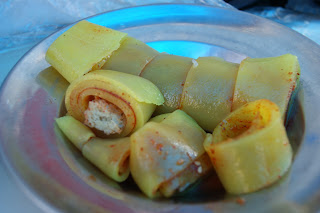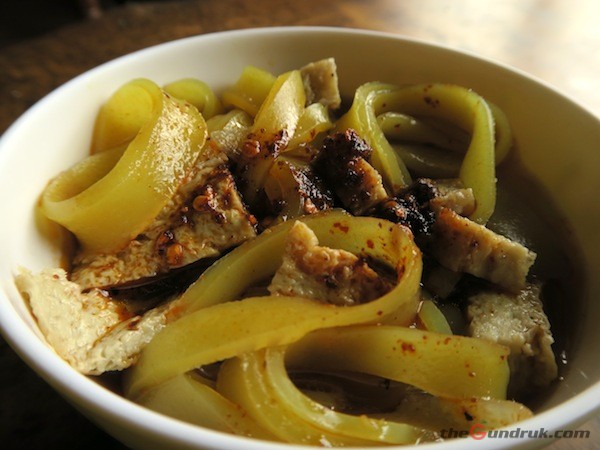LAPHING
One of my colleague said, "Let's
go to eat laphing. When she said that, I changed my express ion and said, "Laphing?" At
first, I heard, laughing but later when I went in the laphing shop, I knew the
spelling. At the beginning, I ate soup laphing with spicy which I didn't like
but later I ordered dry with less spicy which was good. Later, I became addicted
towards laphing. I wanted to know more about laphing and started searching about
it through.


Laphing is
a spicy cold mung
bean noodle dish in Tibetan cuisine. It is a street
food.[1] It can be
eaten with red pepper chili, cilantro and green onion sauce. The noodles have a
slippery texture and are served with a soy sauce gravy. It is traditionally a
summer food. A tool is used to shape it.
In other words, it is a cold, spicy
and savory noodle dish often eaten in summer. The noodle is made from
extracting starch from the potato, mung bean or wheat flour, and also gluten
extracted from the flour is served with the noodle. Gluten has tofu like meaty
texture. Spices and condiments such as soy sauce, garlic extract, Szechuan
pepper, red chili paste, sesame oil and vinegar give Laphing a peculiar and
perfectly balanced flavor.
Laphing is originally a Northern
Chinese cuisine known as Liangfen, which literally translates to cold noodle.
This dish travelled to Nepal with Tibetan and Chinese people who later settled
in Boudha.
I often read Movers and Shakers [M and
S] magazine, the writer Gaurav Potel has described about laphing which I really
liked. He has given such a good description about it.
According to the research done by him,
laphing can be divided into three parts: the laphing pancake, the condiments
and the soup.
LAPHING PANCAKE
It’s flat and jelly-like, prepared the night before it’s
served with flour or corn starch. The taste itself is bland, but the pancakes
are what make the fulfilling and chewy part of this Tibetan fare. If you go in
the shop, as per order, the seller pulls out one pancake from the heap, seasons
it, adds a few other condiments and rolls it, before chopping it into smaller
bite-size pieces. It’s these steps that turn laphing into a noodle-like dish.
THE CONDIMENTS
The condiments are really simple, and easily available too,
should you feel like seeking them out near your neighbourhood. Before the
laphing is sliced, over the laphing pancake is lathered a tablespoonful of
chilli paste and some salt, along with Sichuan powder and garlic powder. To
provide a bit of chewy texture, strips of rehydrated dried soybeans (masyaura)
are also used.
THE SOUP
The soup is essentially a mix of a lot of soy sauce seasoned
with a little vinegar to provide the tang. But the vinegar doesn’t overpower
the remaining flavours, particularly the tingling note of Sichuan pepper and
the spiciness of the chilli paste. The whole affair can be really spicy, so keeping
a bottle of water ready on the side is strongly recommended, although you could
very well go for a bowl of dry laphing, which is less spicy and hence goes easy
on your tastebuds.
So, I loved the dish laphing. I want the people to try it.
It is available in some places only.
REFERENCES

Comments
Post a Comment